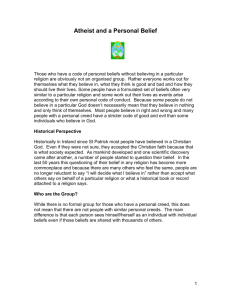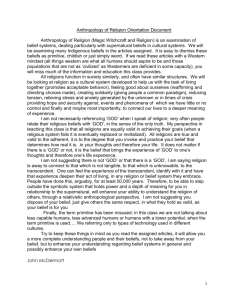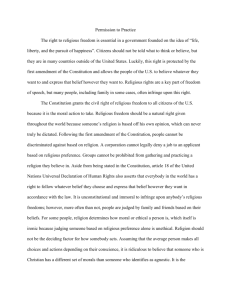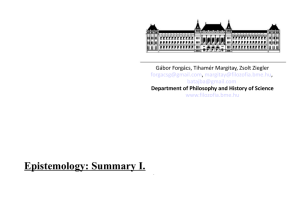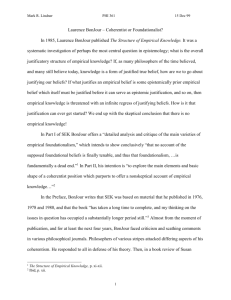1828 Think Christianity
advertisement
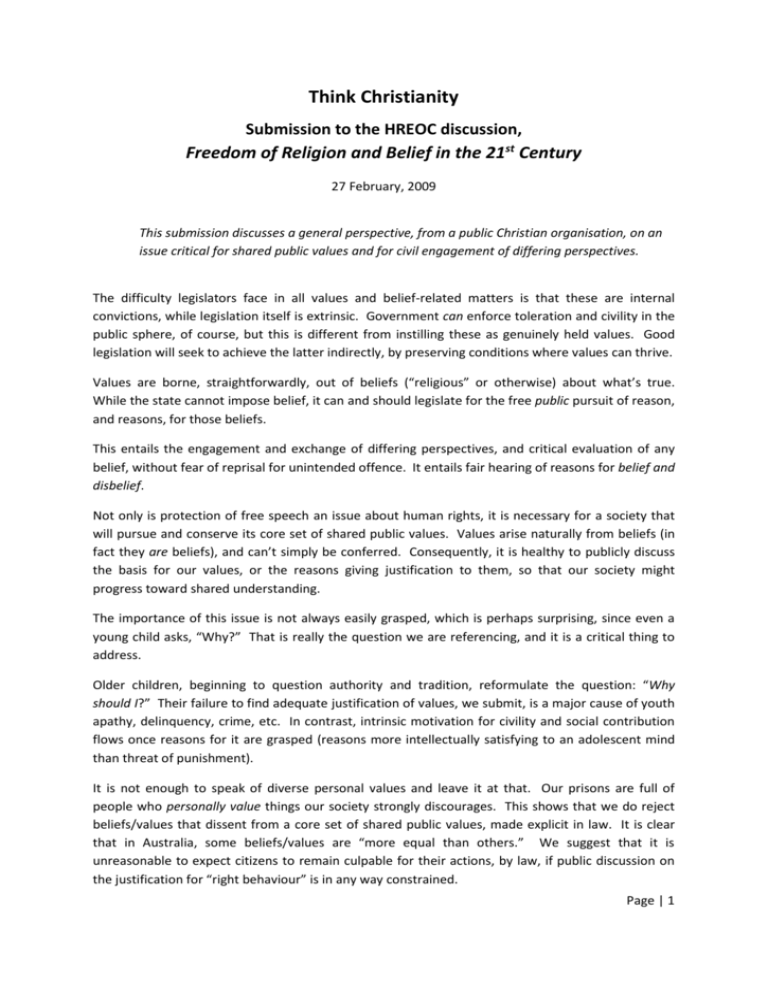
Think Christianity Submission to the HREOC discussion, Freedom of Religion and Belief in the 21st Century 27 February, 2009 This submission discusses a general perspective, from a public Christian organisation, on an issue critical for shared public values and for civil engagement of differing perspectives. The difficulty legislators face in all values and belief-related matters is that these are internal convictions, while legislation itself is extrinsic. Government can enforce toleration and civility in the public sphere, of course, but this is different from instilling these as genuinely held values. Good legislation will seek to achieve the latter indirectly, by preserving conditions where values can thrive. Values are borne, straightforwardly, out of beliefs (“religious” or otherwise) about what’s true. While the state cannot impose belief, it can and should legislate for the free public pursuit of reason, and reasons, for those beliefs. This entails the engagement and exchange of differing perspectives, and critical evaluation of any belief, without fear of reprisal for unintended offence. It entails fair hearing of reasons for belief and disbelief. Not only is protection of free speech an issue about human rights, it is necessary for a society that will pursue and conserve its core set of shared public values. Values arise naturally from beliefs (in fact they are beliefs), and can’t simply be conferred. Consequently, it is healthy to publicly discuss the basis for our values, or the reasons giving justification to them, so that our society might progress toward shared understanding. The importance of this issue is not always easily grasped, which is perhaps surprising, since even a young child asks, “Why?” That is really the question we are referencing, and it is a critical thing to address. Older children, beginning to question authority and tradition, reformulate the question: “Why should I?” Their failure to find adequate justification of values, we submit, is a major cause of youth apathy, delinquency, crime, etc. In contrast, intrinsic motivation for civility and social contribution flows once reasons for it are grasped (reasons more intellectually satisfying to an adolescent mind than threat of punishment). It is not enough to speak of diverse personal values and leave it at that. Our prisons are full of people who personally value things our society strongly discourages. This shows that we do reject beliefs/values that dissent from a core set of shared public values, made explicit in law. It is clear that in Australia, some beliefs/values are “more equal than others.” We suggest that it is unreasonable to expect citizens to remain culpable for their actions, by law, if public discussion on the justification for “right behaviour” is in any way constrained. Page | 1 Whether from the perspective of a child, youth or adult, there is a need to question received public values, to seek a sufficient basis for holding them. Justification is regarded as intellectually virtuous, and this kind of reasonable understanding promotes psychological wellbeing. It is arguably a lack of amicable discussion of reasons for belief, that leaves no alternative to the paradigm of taking personal offence. Emotional defensiveness in turn stymies reasonable discussion between diverse perspectives. In our country it is a present a present opportunity and challenge to lift the standard of public discourse to an adult level. If it is critical for values to be based on reasonably justified beliefs, it would seem uncertain whether “Australian values” is by itself a stable concept. It is descriptive of what Australians have tended to value over the years, but it is not prescriptive. We would imagine that for an immigrant flying in from their country of origin, it is far from clear how exactly they might convert their core beliefs and values to a new time zone. Of course, we and most other Australians, with differing belief systems, believe that there are good reasons undergirding our country’s traditional values and present laws. It is therefore important to be able to freely discuss these, even if it leads us to metaphysical ground. We realise that metaphysics (along with religion) is pejorative in some circles, but suggest that strict secularism has done us a disservice in this regard. Metaphysics informs beliefs in more down to earth areas like human nature, human capacity and potential, notions of history, progress, social justice, social care, and so on. It includes beliefs concerning laws of logic and mathematics, as well as those traditionally regarded as religious. Both religious and nonreligious Australians have metaphysical beliefs. For this reason we see “religious” as a less helpful cateogry than “belief system,” or worldview. A legislation-facilitated role for the open discussion of metaphysical questions about the basis for moral values – even if that courts religious perspectives in tension with each other – is the only way to address the critical need of individuals to have their values intellectually justified. Conclusion We humbly submit that it is necessary for encouraging good citizenship, for intrinsic motivation to public civility, for shared understanding and the flourishing of shared public values, to foster healthy and free interchange between Australians on the most basic question of why, or whether, something is worth believing/valuing. This promotes the pluralistic ideal of a marketplace of ideas, and makes possible a tolerance and respect for those who differ, precisely because differences of belief are acknowledged and considered. Implicitly, the foundations for belief are acknowledged to matter, and that is a healthy basis on which Australian society can proceed. After all, to understand and be understood by others is a driving human need. Page | 2




